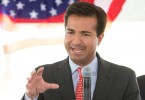There is no reason, said Shawn Jain, as we stood on the 5th floor of the Whitman Walker Health facility admiring the panoramic view of Washington, DC, that just because you are poor you should be seen in a ghastly place. And no reason, if you are gay or transgender, to creep guiltily in through an unmarked door, to get testing or treatment.
But slipping silently into the anonymous clinic in the basement of a church was precisely how the now spectacularly deluxe Whitman Walker Health facility began life. In November 1973, The Gay Men’s VD Clinic, part of the Washington Free Clinic, opened its doors in the basement of the Georgetown Lutheran Church.
After more than four decades of evolution and moves, Whitman Walker Health just last year opened a brand new six-story full-service medical center at 1525 14th St., NW. (The organization also retains its Elizabeth Taylor Medical Center a few blocks up the street which houses much of the non-medical staff.)
The center comprises 42,000 square feet of state-of-the-art medical facilities along with a pharmacy whose giant storefront windows are an open and far from anonymous invitation to all. It cost $9.8 million, a very long way from the sleazy backstreet options of past times.
The early days of Whitman Walker began even before the AIDS crisis hit. Today, the patients are split about evenly between those who are HIV positive and negative. Yet, despite its location in the heart of DC’s gay Logan Circle/Dupont Circle neighborhood, the health center is by no means exclusively for the LGBT community. It is geared toward low income people as well, particularly the pharmacy which can offer affordable prescriptions and whose revenue provides the bulk of the funding for the health center.
Nevertheless, the focus is clearly on the particular needs of LGBT patients, something which can be absent in traditional practices or larger medical institutions. “The doctors here are mission driven,” said Jain, Director of Communications for Whitman Walker Health. The doctors are salaried and paid competitively, but, says Jain, “while they might not be making as much as say a cardiologist with their own practice, they are inspired to be here.”
Beyond inspiration and dedication, the medical staff must have strong medical competency and experience in the field of LGBT care in order to properly treat their patients. For example, says Jain, “if you’re the only trans patient your doctor has ever seen, you might know more than the doctor,” a situation a trans patient at Whitman Walker will never need to confront. Equally, says Jain, “some HIV patients are easier to treat than others and there is value in seeing a doctor who has treated a lot of HIV.”
Equally, cultural competency is valued — and training is provided — at Whitman Walker, including to doctors in the wider medical community. This could be as simple as knowing which pronoun to use with a trans patient. Typically, LGBT patients have to confront far more searing prejudices in the wider world — including the refusal of treatment. Whitman Walker provides that safe space where there is no chance or rejection or scorn.
But there is a lot more to Whitman Walker than basic medical care. There are counseling facilities, massage therapy, dentistry. Indeed there are 28 medical exam rooms, and nine dental suites. There is even a legal department which recently offered a name and gender change clinic at the Elizabeth Taylor location.
Whitman Walker Health turns the off-quoted phrase about LGBT discrimination on its head: “A couple who gets married at 10 a.m. remains at risk of being fired from their jobs by noon and could be evicted from their home by 2 p.m., simply for posting their wedding photos on Facebook.”
At Whitman Walker you could have a medical consultation at 10am, a dental appointment at noon, a group psychotherapy session at 2pm, collect your prescriptions and post it all on Facebook with no fear of retribution and with the same location stamp. It’s the ultimate one-stop-shopping of healthcare.
But are these five-star facilities actually making a difference? Absolutely, said Jain who provided a detailed tour of the sparkling and expansive facility. “We’re seeing about 500 new HIV cases per year now whereas five to six years ago we were seeing 1,200. It’s a huge decrease and it has a lot to do with more people getting HIV tests.”
The statistics in DC are helped by the environment here, where, says Jain “Ninety per cent of people have health insurance.” This comes in stark contrast to Florida for example, which in 2014, along with Alaska and Texas, had the highest rate of uninsured people in the country, at 16% or higher according to the U.S. Census Bureau.
When the new Whitman Walker Health facility opened last year, it’s executive director, Don Blanchon, proclaimed it “a sanctuary where each person’s character transcends the all-too-real limitations of society’s labels.” Those individuals says Jain, include “the homeless, people in transitional housing, in difficult family circumstances, those doing sex work to survive.” They are the common stories of the LGBT human condition, people who are all too often cast out from a stable family environment where medical treatment would have been more routine.
But Whitman Walker Health has its hip side too. After all, it’s named after super cool gay poet, Walt Whitman, and women’s rights activist and Civil War-era physician, Dr. Mary Edwards Walker. So if you’d rather avoid the, well, clinical environment of a health clinic to get your HIV test, you can turn up at the cutting edge 9:30 Club instead. Just recently, Whitman Walker Health was offering HIV tests there, between 10pm and the wee hours, along with a chance to dance the night away in celebration of the club’s “official Mid-Atlantic Leather Weekend.”
Photo Credit: whitman-walker.thankyou4caring.org







